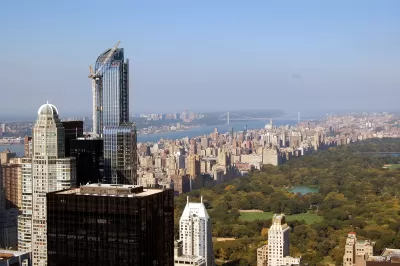Reduced demand for office space after coronavirus could lead New York landlords to consider the conversion of offices to residential spaces.

Many office spaces in New York sit empty as occupants work from home in light of social distancing requirements. If the trend continues after shelter-in-place orders are lifted, office landlords could consider converting their commercial assets into residential spaces.
"Some real estate pros maintain that companies and employees will be happier than ever to return to their offices after the crisis subsides, while others are predicting a more permanent decline in demand for office space. And they already have a solution in mind for how commercial landlords could handle this: turn their offices into residential buildings to help alleviate New York’s housing crisis," writes Eddie Small.
While office-to-residential conversions could generally increase the amount of housing in large cities, it's not a given that these options would be affordable. Profit-driven landlords would respond to economic incentives to build luxury condos rather than apartments.
If demand for office space is decreased, says Urban Institute senior fellow Brett Theodos, it's more likely to be a symptom of economic hardship than of an increased preference for remote workspaces. Center for an Urban Future executive director Jonathan Bowles predicts that the retail sector, which was struggling even before the pandemic, is more likely to make lasting adjustments after the pandemic subsides.
FULL STORY: Could NY’s work from home moment fuel office-to-residential conversions?

Planetizen Federal Action Tracker
A weekly monitor of how Trump’s orders and actions are impacting planners and planning in America.

Chicago’s Ghost Rails
Just beneath the surface of the modern city lie the remnants of its expansive early 20th-century streetcar system.

San Antonio and Austin are Fusing Into one Massive Megaregion
The region spanning the two central Texas cities is growing fast, posing challenges for local infrastructure and water supplies.

Since Zion's Shuttles Went Electric “The Smog is Gone”
Visitors to Zion National Park can enjoy the canyon via the nation’s first fully electric park shuttle system.

Trump Distributing DOT Safety Funds at 1/10 Rate of Biden
Funds for Safe Streets and other transportation safety and equity programs are being held up by administrative reviews and conflicts with the Trump administration’s priorities.

German Cities Subsidize Taxis for Women Amid Wave of Violence
Free or low-cost taxi rides can help women navigate cities more safely, but critics say the programs don't address the root causes of violence against women.
Urban Design for Planners 1: Software Tools
This six-course series explores essential urban design concepts using open source software and equips planners with the tools they need to participate fully in the urban design process.
Planning for Universal Design
Learn the tools for implementing Universal Design in planning regulations.
planning NEXT
Appalachian Highlands Housing Partners
Mpact (founded as Rail~Volution)
City of Camden Redevelopment Agency
City of Astoria
City of Portland
City of Laramie





























